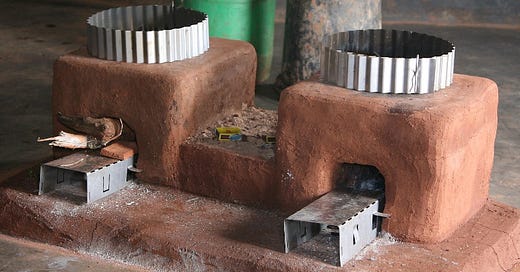C-Quest files for bankruptcy. Bridge Carbon continues to market its cookstove carbon offsets
“Who deserves to cook with wood inside their house?”
On 27 February 2025, C-Quest Capital filed for bankruptcy in the US Bankruptcy Court for the District of Delaware. C-Quest was set up in 2008 by Ken Newcombe, who faces criminal charges for over issuing millions of carbon credits.
Newcombe was one of the key proponents of carbon trading. In the 1990s, he worked at the World Bank, where he set up the Prototype Carbon Fund. He left the Bank in 2006 to work at Climate Change Capital, the world’s largest private sector carbon fund.
After that, he spent a year running Goldman Sachs’ carbon desk before launching C-Quest Capital.
He left C-Quest in February 2024 as a scandal emerged about “the over-issuance of millions of carbon credits” from C-Quest’s clean cooking stove projects.
In October 2024, the US Attorney’s Office for the Southern District of New York announced criminal charges against Newcombe and C-Quest’s ex-managing director Tridip Goswami. If found guilty, Newcombe faces up to 20 years in prison. He denies the allegations. He also is suffering from terminal cancer.
C-Quest
Five companies have filed for bankruptcy — all are incorporated in the tax haven of Delaware:
CQC Impact Investors LLC;
C-Quest Capital LLC;
CQC Marketing LLC;
Transformation Advisory LLC; and
C-Quest Capital Africa LLC.
C-Quest Capital is a wholly owned subsidiary of CQC Impact Investors. The company currently has no directors (and the team page on the company’s website has been removed since September 2024).
CQC Marketing, Transformation Advisory, and C-Quest Capital Africa are all wholly owned subsidiaries of C-Quest Capital.
Vision Ridge Partners
An investment firm called Vision Ridge Partners holds a majority of the shares in CQC Impact Investors LLC. C-Quest Capital’s most recent CEO, Jules Kortenhorst, was previously a partner with Vision Ridge Partners.
In June 2023, Newcombe incorporated a company in the UK called C-Quest Capital SVCS UK Limited. The company was controlled by C-Quest Capital.
Newcombe resigned as director of C-Quest Capital SVCS UK in February 2024. In November 2024, the company was renamed as Bridge Carbon UK Services Limited in the UK and it is now controlled by a company called Bridge Carbon Limited.
Bridge Carbon was incorporated in the UK on 27 August 2024. Jules Kortenhorst was appointed CEO of the company on 1 November 2024. Bridge Carbon is controlled by SAF CQC Holdings Limited, which in turn is controlled by Reuben Munger.
Munger founded Vision Ridge Partners in 2008.
In June 2024, with Kortenhorst as CEO, C-Quest Capital put out a press release alleging that it had “uncovered wrongdoing by its former Chief Executive Officer, Kenneth Newcombe”.
In response to the allegations, a spokesperson for Newcombe told Carbon Pulse that the allegations against Newcombe are part of a scheme by Vision Ridge to take over C-Quest Capital. The spokesperson said that,
It is clear that Vision Ridge – a minority shareholder that has gained de facto control of C-Quest’s board of directors and is behind the company’s press release – is driven by financial opportunism and is willing to engage in public relations gamesmanship and other misconduct to get what it wants: a windfall profit at Dr. Newcombe’s expense.
Bridge Carbon
A November 2024 press release about the launch of Bridge Carbon states that,
The Company launches with a portfolio of 1.5 million deployed clean cookstoves across Sub-Saharan Africa and Southeast Asia, as well as economic rights to a methane gas repair project in Bangladesh, which were acquired from C-Quest Capital LLC.
Bridge Carbon claims that it only took over the “high-quality, viably operating cookstoves” following a “comprehensive review” of C-Quest’s projects.
But Bridge Carbon will continue to generate carbon credits. Even if it does manage to reduce carbon emissions by distributing more efficient cookstoves, any climate benefit is wiped out by the sale of carbon credits to corporations that continue polluting.
C-Quest had a 60 million carbon credit deal with Shell, for example.
And while Bridge Carbon has lots to say about “rigorous methodologies” it says nothing about the fact that many of C-Quest’s cookstoves quickly fell to pieces.
“Who deserves to cook with wood inside their house?”
In September 2024, The Washington Post reported that “C-Quest failed to take steps to ensure that its clay and metal cookstoves were being widely used and working properly.”
The cookstoves were damaged by the rain. So several villagers, who had previously cooked outdoors, brought the stoves inside. With poor ventilation, they ended up increasing their exposure to wood smoke.
Reporters for The Washington Post visited hundred of homes of people who had received cookstoves. The Post reports that,
It was hard to find anybody still using the devices. People were cooking much as they had before the project launched: with charcoal or three-stone fires, outdoors.
One woman told The Post that,
“People with more income wouldn’t be proud to use this thing. It looks like something a poor person would have.
“If you want to help someone, you have to help them leave poverty. Bring us a proper stove. Who deserves to cook with wood inside their house? We need good things, too.”








Great post, thanks! There's two intractable problems here- Cooking requires energy input, only options are fire or solar energy. There are solar ovens available, weather permitting. Any fire indoors impairs air quality. Carbon credits being used as offsets is a "net-zero" trick, meaning one spot supposedly trapping carbon could offset another's emission. That would only be meaningful in a world with a steady CO2 level. No amount of carbon credits can ever result in actually lowering atmospheric carbon levels; even if they were truly effective, that level would remain the same.